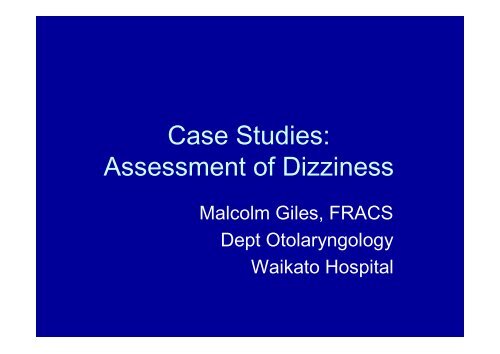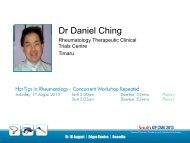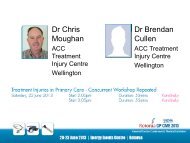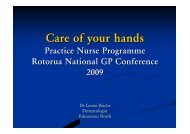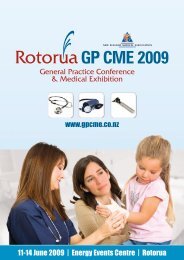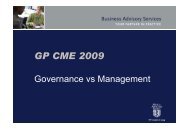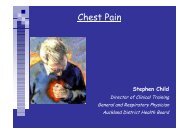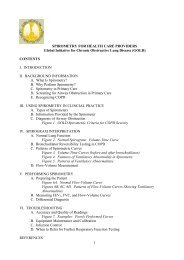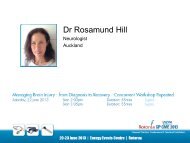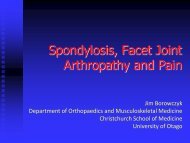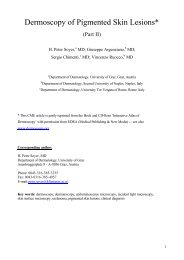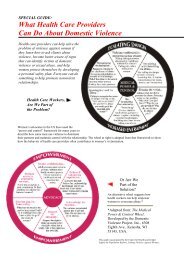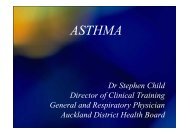Case Studies: Assessment of Dizziness
Case Studies: Assessment of Dizziness
Case Studies: Assessment of Dizziness
Create successful ePaper yourself
Turn your PDF publications into a flip-book with our unique Google optimized e-Paper software.
<strong>Case</strong> <strong>Studies</strong>:<br />
<strong>Assessment</strong> <strong>of</strong> <strong>Dizziness</strong><br />
Malcolm Giles, FRACS<br />
Dept Otolaryngology<br />
Waikato Hospital
Balance<br />
• Our sense <strong>of</strong> balance is very important to<br />
us…
Problems<br />
o <strong>Dizziness</strong> is a nonspecific symptom<br />
o Patients find it difficult to describe<br />
o History key<br />
o Variety possible pathologies<br />
o Commonest presenting symptom >75<br />
y.o.<br />
o Only one quarter have vertigo
Problems<br />
o Hearing loss is common<br />
o Hearing loss may have everything or<br />
nothing to do with dizziness<br />
o History is <strong>of</strong>ten complicated past<br />
diagnoses, drug Rx, medical Hx
o Vestibular<br />
o<br />
o Peripheral<br />
(distal to<br />
brainstem)<br />
o Central<br />
(brainstem or<br />
higher)<br />
Nonvestibular<br />
Categories
Axioms<br />
o Vertigo = hallucination <strong>of</strong> movement<br />
o Vertigo + unilateral auditory =<br />
peripheral<br />
o Vertigo + CNS symptoms = central<br />
o Vertigo recovers = peripheral
Axioms<br />
o Vertigo = worsened<br />
by movement<br />
o Vertigo ≠ ability to<br />
keep going
Approach to the Dizzy Patient<br />
o Symptoms:<br />
o Vertigo: hallucination movement, exacerbated<br />
head turning<br />
o Auditory symptoms: hearing loss, tinnitus<br />
o Unilateral or bilateral<br />
o CHANGE WITH ATTACK<br />
o CNS: LOC, diplopia, blurred vision, hemiparesis,-<br />
anaesthesia, dysphasia, headache<br />
o RECOVERY
Approach to the Dizzy Patient<br />
o Signs:<br />
o Vestibular: nystagmus, head impulse test<br />
o Auditory symptoms: Tuning Fork, Audiogram<br />
o Facial Palsy<br />
o CNS: the usual (eye movements, FNF, HTH, Unterberger’s)<br />
o Dix Hallpike
Framework<br />
o Acute attack <strong>of</strong> vertigo<br />
o Recurrent acute attacks <strong>of</strong> vertigo<br />
o Chronic dizziness
Axioms<br />
o Vertigo + unilateral hearing loss =<br />
peripheral<br />
o Vertigo + CNS symptoms = central<br />
o Vertigo on its own which recovers =<br />
peripheral
Acute attack <strong>of</strong> vertigo<br />
o Vertigo + unilateral hearing loss =<br />
peripheral<br />
o Vertigo + CNS symptoms = central<br />
o Vertigo on its own which recovers =<br />
peripheral
Acute attack <strong>of</strong> vertigo<br />
o Shows the vertigo in purest form<br />
o GP not Specialist Problem
Acute attack <strong>of</strong> vertigo<br />
o Vertigo + unilateral auditory symptoms<br />
o <br />
o <br />
o <br />
o
Acute attack <strong>of</strong> vertigo<br />
o Vertigo + unilateral auditory symptoms<br />
o First attack Meniere’s<br />
o Labyrinthitis<br />
o Ramsey Hunt syndrome<br />
o Temporal bone trauma<br />
o Cholesteatoma
Acute attack <strong>of</strong> vertigo<br />
o Vertigo + unilateral auditory<br />
symptoms<br />
o First attack Meniere’s<br />
o Labyrinthitis<br />
o Ramsey Hunt syndrome<br />
o Temporal bone trauma<br />
o Cholesteatoma<br />
1. Unilateral hearing<br />
loss<br />
2. Episodic vertigo<br />
lasting hours<br />
3. Unilateral roaring<br />
tinnitus<br />
4. Unilateral aural<br />
pressure
Acute attack <strong>of</strong> vertigo<br />
o Vertigo + unilateral<br />
auditory symptoms<br />
o First attack Meniere’s<br />
o Labyrinthitis<br />
o Ramsey Hunt syndrome<br />
1. Severe hearing loss<br />
2. Severe tinnitus<br />
3. Severe vertigo<br />
4. Viral or bacterial<br />
o Temporal bone trauma<br />
o Cholesteatoma
Acute attack <strong>of</strong> vertigo<br />
o Vertigo + unilateral<br />
auditory symptoms<br />
o First attack Meniere’s<br />
o Labyrinthitis<br />
o Ramsey Hunt syndrome<br />
o Temporal bone trauma<br />
o Cholesteatoma
Acute attack <strong>of</strong> vertigo<br />
o Vertigo + unilateral auditory<br />
symptoms<br />
o First attack Meniere’s<br />
o Labyrinthitis<br />
o Ramsey Hunt syndrome<br />
o Temporal bone trauma<br />
o Cholesteatoma
Acute attack <strong>of</strong> vertigo<br />
o Vertigo + CNS symptoms<br />
o Cerebellar infarct<br />
o CVA<br />
o TIA<br />
o Demyelination
Acute attack <strong>of</strong> vertigo<br />
o Vertigo on its own<br />
o
Acute attack <strong>of</strong> vertigo<br />
o Vertigo on its own<br />
o Vestibular neuronitis<br />
o Cerebellar infarct<br />
o Head impulse test very helpful!
Acute attack <strong>of</strong> vertigo<br />
o Head thrust<br />
o Unilateral lesion= “flick” on weak side<br />
QuickTime and a<br />
Video decompressor<br />
are needed to see this picture.
Acute attack <strong>of</strong> vertigo<br />
o No other symptoms, positive head thrust<br />
o Vestibular neuronitis<br />
QuickTime and a<br />
Video decompressor<br />
are needed to see this picture.
Acute attack <strong>of</strong> vertigo<br />
o No other<br />
symptoms,<br />
positive head<br />
thrust<br />
o Vestibular<br />
neuronitis<br />
o Presumed viral<br />
infection<br />
o Common in GP<br />
QuickTime and a<br />
Video decompressor<br />
are needed to see this picture.
Acute attack <strong>of</strong> vertigo<br />
o No other symptoms, negative head thrust<br />
o POSSIBLE CEREBELLAR INFARCT<br />
o IF IN DOUBT, FIND OUT<br />
QuickTime and a<br />
Video decompressor<br />
are needed to see this picture.
Acute attack <strong>of</strong> vertigo<br />
o Management<br />
o Vertigo + hearing loss-> refer<br />
o Vertigo + CNS -> refer<br />
o Vertigo + HIT -> sedatives<br />
o IM stemetil, buccastem, IV diazepam
Acute attack <strong>of</strong> vertigo<br />
o Management Vestibular Neuronitis<br />
o Failure to improve rapidly -> refer for Scan<br />
o Disabled 2 days, unwell 2 weeks, recovery 2<br />
months<br />
o About 10% don’t recover!<br />
o Encourage activity!
Recurrent acute vertigo<br />
o Vertigo + unilateral hearing loss =<br />
peripheral<br />
o Vertigo + CNS symptoms = central<br />
o Vertigo on its own which recovers =<br />
peripheral
Recurrent acute vertigo<br />
o Recurrent vertigo + unilateral hearing loss<br />
o
Recurrent acute vertigo<br />
o Recurrent vertigo + unilateral hearing loss<br />
o Meniere’s<br />
o Vestibular Schwannoma<br />
o Other (otosyphillis, cholesteatoma, autoimmunity)<br />
o Will require specialist assessment and advice
Recurrent acute vertigo<br />
o Recurrent vertigo + CNS<br />
o TIAs<br />
o VBI<br />
o Demyelination
Recurrent acute vertigo<br />
o Recurrent vertigo on its own<br />
o Brief<br />
• <br />
o Prolonged<br />
•
Recurrent acute vertigo<br />
o Recurrent vertigo on its own<br />
o Brief<br />
•BPV<br />
o Prolonged<br />
•Migraine
Recurrent acute vertigo<br />
o BPV<br />
o Characteristic triggers:<br />
• “Washing vertigo”<br />
• “Top shelf vertigo”<br />
• “Bottom cupboard vertigo”<br />
• Rolling over in bed<br />
o Dix Hallpike test<br />
o May need repeating
Recurrent acute vertigo<br />
o BPV<br />
o Dix Hallpike
Recurrent acute vertigo<br />
o BPV<br />
o Dix Hallpike: Nystagmus<br />
QuickTime and a<br />
YUV420 codec decompressor<br />
are needed to see this picture.
Recurrent acute vertigo<br />
o BPV<br />
o Epley<br />
o Should now be GP management
• http://www.dizziness-andbalance.com/disorders/bppv/epley/first.html
Recurrent acute vertigo<br />
o Epley<br />
o For at least one week, avoid provoking head<br />
positions that might bring BPPV on again.<br />
o Use two pillows when you sleep.<br />
o Avoid sleeping on the "bad" side.<br />
o Don't turn your head far up or far down.
Recurrent acute vertigo<br />
o Migraine<br />
o Recurrent attacks <strong>of</strong> vertigo without<br />
auditory symptoms unlikely Meniere’s<br />
o Migraine is common (16%)<br />
o Vertigo is common in migraine<br />
o Meniere’s is rare (.2%)
Recurrent acute vertigo<br />
o Migraine<br />
o Past history Migraine<br />
o Travel sickness<br />
o Attacks last more than several hours<br />
o Photophobia, phonophobia<br />
o Sleepiness<br />
o Triggers: tiredness, food, etc
Recurrent acute vertigo<br />
o Migraine versus Meniere’s- still in doubt- REVIEW<br />
DURING ATTACK<br />
o Acute Audiogram<br />
o Ask patient about photophobia and phonophobia<br />
o Head Impulse Test -ve Migraine +ve Meniere’s
Recurrent acute vertigo<br />
o Symptomatic relief<br />
o Buccastem<br />
o Prevention<br />
o Meniere’s: Betahistine, salt restriction<br />
o Migraine: lifestyle, prophylaxis
Chronic <strong>Dizziness</strong><br />
o Chronic dizziness + unilateral auditory<br />
o Chronic dizziness + CNS<br />
o Chronic dizziness on its own
Chronic <strong>Dizziness</strong><br />
o Chronic dizziness + unilateral auditory -><br />
refer!<br />
o
Chronic <strong>Dizziness</strong><br />
o Chronic dizziness +<br />
unilateral auditory -><br />
refer!<br />
QuickTime and a<br />
Photo - JPEG decompressor<br />
are needed to see this picture.<br />
o Vestibular schwannoma<br />
o Chronic otitis media,<br />
Meniere’s
Chronic <strong>Dizziness</strong><br />
o Chronic dizziness + CNS -> refer!<br />
o Many possible diagnoses here
Chronic <strong>Dizziness</strong><br />
o Chronic dizziness on its own<br />
o Many possible diagnoses here<br />
o Three Otoneurological<br />
• Ototoxicity<br />
• BPV in older patient<br />
• Failure to compensate unilateral lesion
Chronic <strong>Dizziness</strong><br />
o Chronic dizziness on its own<br />
– College et al BMJ 1996; 313:788-792<br />
– large study <strong>of</strong> elderly dizzy<br />
– Multiple diagnoses 84%<br />
– Vascular disease, cervical spondylosis, anxiety<br />
– BPPV<br />
– MR unhelpful<br />
• More recent research suggests BPV may be<br />
much more common than this
Chronic <strong>Dizziness</strong><br />
o Other Otoneurological<br />
o Ototoxicity<br />
o Follows chemotherapy, cardiac surgery<br />
o Aminoglycosides<br />
o Severe disability<br />
o Often presents LATE
Chronic <strong>Dizziness</strong><br />
o Ototoxicity<br />
QuickTime and a<br />
Video decompressor<br />
are needed to see this picture.
Chronic <strong>Dizziness</strong><br />
o Otoneurological<br />
Management:<br />
o <strong>Assessment</strong><br />
(vestibular<br />
function tests,<br />
posturography)<br />
o Rehabilitation (Tai<br />
Chi, exercises)
Chronic <strong>Dizziness</strong><br />
o Otoneurological<br />
Management:<br />
o <strong>Assessment</strong><br />
(vestibular<br />
function tests,<br />
posturography)<br />
o Rehabilitation (Tai<br />
Chi, exercises)
Epley Movie<br />
• http://dizziness-andbalance.com/disorders/bppv/movies/Epl<br />
ey-480x640.avi


